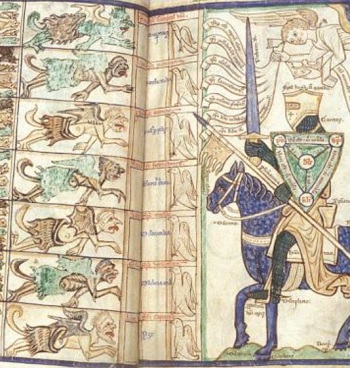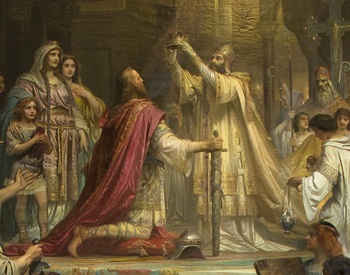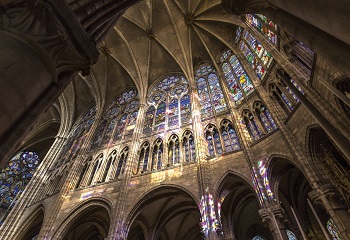Organic Society
 |
 |
 |
 |
 |
 |
 |
Organicity & Spontaneity in Man & Societies
Is organicity the same as spontaneity? At what point is spontaneity in man good and normal, and when would it be bad and need to be corrected? In the latter case, when would spontaneity require some constraint and direction?
To reach its normal progress, organicity consults nature in everything - even when it is deformed or twisted.
Let us imagine a man who has a deformed foot. He was born with an anatomically flawed foot, with a twisted part between his leg and his heel. This foot, by nature, tends to prevent him from walking normally. On the other hand, it is not completely abnormal: its muscles are still good, he still has good physical strength in his leg, etc.
What should a man of good sense do in such a situation? He would not say: “I should just do nothing and follow a spontaneous path with my foot. Therefore, I shall just go along limping all my life. I do not need to do anything to correct my foot.” Acting in this way, his foot will become more and more deformed. He will aggravate the problem and, after a while, will completely lose the use of his foot.
The man of common sense goes to an orthopedist, who indicates to him a gadget, shoe or some other such device that helps him to correct that defect. Thus, after a while the process repairs the defect and the use of his foot is restored to the closest degree of normality possible.
 Thus also it is with man. As a consequence of the Original Sin, he has many good spontaneities along with the bad ones that make him “orthopedically” crippled. He desires things that he should not want. There is not a single man who is not like this.
Thus also it is with man. As a consequence of the Original Sin, he has many good spontaneities along with the bad ones that make him “orthopedically” crippled. He desires things that he should not want. There is not a single man who is not like this.
But, if he puts on an orthopedic shoe, so to speak, he is able to achieve the best of his organicity. So, organicity is not entirely spontaneous. But it has all kinds of spontaneity added to the necessary portions of correction, at times painful, required by his nature.
In this way he becomes habituated to this directed spontaneity and walks on a good path.
Behind this there is a concept. It is the concept of good and evil. What is good? What is evil? There are some things that are in accordance with the order of the human will and there are others that are not. What is the criterion to differentiate between the good and the evil?
Concretely, it is the Law of God, the Commandments and Catholic doctrine. Catholic doctrine exists not only to correct the twisted foot. It gives vitality to the entire organism. Everything that the soul has of the good, upright and healthy becomes invigorated. This is the effect of the Catholic Church over souls and, therefore, over a group of persons, over an organic society. Now, outside of the Church, there are degrees of organicity caused by the remnants of the tradition of the Church that still remain. A Greek Schismatic, a Protestant may have remnants of organicity along with deformations.
 Now then, before going further, an honest examination of conscience is necessary. The person must recognize that he has a twisted foot. If he does not see that he has this defect, he will never go to the orthopedist. He needs, therefore, to acknowledge his defect and have the will to heal it. This is indispensable.
Now then, before going further, an honest examination of conscience is necessary. The person must recognize that he has a twisted foot. If he does not see that he has this defect, he will never go to the orthopedist. He needs, therefore, to acknowledge his defect and have the will to heal it. This is indispensable.
Sometimes the person decides to indulge in such defects, claiming that they are picturesque characteristics of his family or region. This is not an attenuating factor, but rather an aggravating one. This is not organicity.
Thus, the actions of those who practice the Catholic Faith bring a nation to its normality, its proper order, thus constituting the organic element within society.
Were the old civilizations organic societies?
Someone could make this objection: “To say that complete organicity can only exist in Catholics influenced by the Church is unilateral. The pagan nations lived 500 to 600 years in regimes of peace. Therefore, organicity is linked to high worldly prosperity rather than the influence of the Catholic Church.”
I respond: We should not confuse stability with organicity. We can conceive a class, a province or other social-political unit that imposes its great power over others by force and thus maintains a simulacrum of order for a long time. The ones who are subdued are resigned to that power because they do not have enough force to react. They submit themselves to an unjust peace. This can in fact reflect stability, but this is not organicity.
Organicity is when everything is maintained following the upright disposition of nature: The good is encouraged, the bad suppressed. That good is stimulated with the dynamism proper to its nature, and still more by grace. Thus nature gives all the fruits it can give.
 Who can claim that the ancient Egyptians gave all that they could? They gave a lot, this is undeniable. But I do not believe they did all that they could have. The Chinese had a great civilization. Did they give all that they could? I do not think so.
Who can claim that the ancient Egyptians gave all that they could? They gave a lot, this is undeniable. But I do not believe they did all that they could have. The Chinese had a great civilization. Did they give all that they could? I do not think so.
There is only one part of the world where we can say that a people gave more than any others: This was Christendom. The Christian nations had an impulse that Egypt did not have. They went as far as they could, and had they not been stopped by the Revolution, no one knows how far they might have gone. No one has an idea of what could have been the grandeur of the West if it were not for the intervention of the Revolution. It is unimaginable!
Therefore, the grandeurs of the Egypt, as well as that of Greece and Rome, were relative grandeurs.
This is my response to the objection.
Only the Catholic peoples broke the boundaries that no other people did: They gave much more than we can imagine they could give by their own nature. They did this because they followed the model of organic society; they did this because they were assisted by the grace distributed by the Catholic Church.

Posted August 9, 2023
To reach its normal progress, organicity consults nature in everything - even when it is deformed or twisted.
Let us imagine a man who has a deformed foot. He was born with an anatomically flawed foot, with a twisted part between his leg and his heel. This foot, by nature, tends to prevent him from walking normally. On the other hand, it is not completely abnormal: its muscles are still good, he still has good physical strength in his leg, etc.
What should a man of good sense do in such a situation? He would not say: “I should just do nothing and follow a spontaneous path with my foot. Therefore, I shall just go along limping all my life. I do not need to do anything to correct my foot.” Acting in this way, his foot will become more and more deformed. He will aggravate the problem and, after a while, will completely lose the use of his foot.
The man of common sense goes to an orthopedist, who indicates to him a gadget, shoe or some other such device that helps him to correct that defect. Thus, after a while the process repairs the defect and the use of his foot is restored to the closest degree of normality possible.

Medieval man fought sinful nature with the help of grace
But, if he puts on an orthopedic shoe, so to speak, he is able to achieve the best of his organicity. So, organicity is not entirely spontaneous. But it has all kinds of spontaneity added to the necessary portions of correction, at times painful, required by his nature.
In this way he becomes habituated to this directed spontaneity and walks on a good path.
Behind this there is a concept. It is the concept of good and evil. What is good? What is evil? There are some things that are in accordance with the order of the human will and there are others that are not. What is the criterion to differentiate between the good and the evil?
Concretely, it is the Law of God, the Commandments and Catholic doctrine. Catholic doctrine exists not only to correct the twisted foot. It gives vitality to the entire organism. Everything that the soul has of the good, upright and healthy becomes invigorated. This is the effect of the Catholic Church over souls and, therefore, over a group of persons, over an organic society. Now, outside of the Church, there are degrees of organicity caused by the remnants of the tradition of the Church that still remain. A Greek Schismatic, a Protestant may have remnants of organicity along with deformations.

The crowning of Charlemagne;
a glorious apex of medieval Christian Civilization
Sometimes the person decides to indulge in such defects, claiming that they are picturesque characteristics of his family or region. This is not an attenuating factor, but rather an aggravating one. This is not organicity.
Thus, the actions of those who practice the Catholic Faith bring a nation to its normality, its proper order, thus constituting the organic element within society.
Were the old civilizations organic societies?
Someone could make this objection: “To say that complete organicity can only exist in Catholics influenced by the Church is unilateral. The pagan nations lived 500 to 600 years in regimes of peace. Therefore, organicity is linked to high worldly prosperity rather than the influence of the Catholic Church.”
I respond: We should not confuse stability with organicity. We can conceive a class, a province or other social-political unit that imposes its great power over others by force and thus maintains a simulacrum of order for a long time. The ones who are subdued are resigned to that power because they do not have enough force to react. They submit themselves to an unjust peace. This can in fact reflect stability, but this is not organicity.
Organicity is when everything is maintained following the upright disposition of nature: The good is encouraged, the bad suppressed. That good is stimulated with the dynamism proper to its nature, and still more by grace. Thus nature gives all the fruits it can give.

Gothic cathedrals reflect the élan that Christianity had more than any other people in History
There is only one part of the world where we can say that a people gave more than any others: This was Christendom. The Christian nations had an impulse that Egypt did not have. They went as far as they could, and had they not been stopped by the Revolution, no one knows how far they might have gone. No one has an idea of what could have been the grandeur of the West if it were not for the intervention of the Revolution. It is unimaginable!
Therefore, the grandeurs of the Egypt, as well as that of Greece and Rome, were relative grandeurs.
This is my response to the objection.
Only the Catholic peoples broke the boundaries that no other people did: They gave much more than we can imagine they could give by their own nature. They did this because they followed the model of organic society; they did this because they were assisted by the grace distributed by the Catholic Church.

Posted August 9, 2023
Organic Society was a theme dear to the late Prof. Plinio Corrêa de Oliveira. He addressed this topic on countless occasions during his life - at times in lectures for the formation of his disciples, at times in meetings with friends who gathered to study the social aspects and history of Christendom, at times just in passing.
Prof. Plinio
Atila S. Guimarães selected excerpts of these lectures and conversations from the transcripts of tapes and his own personal notes. He translated and adapted them into articles for the TIA website. In these texts fidelity to the original ideas and words is kept as much as possible.
______________________
______________________






